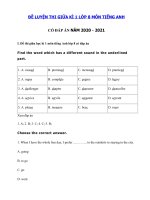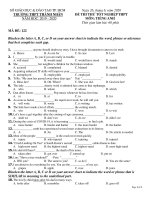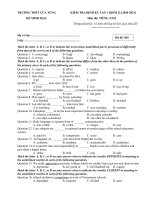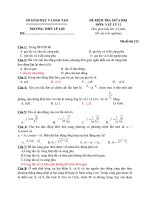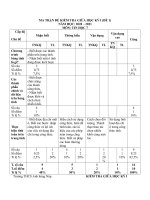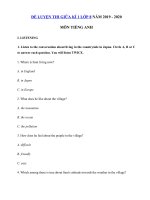Tải Đề thi giữa học kì 1 lớp 11 môn Anh năm 2020 - 2021 - Đề thi giữa học kì 1 môn tiếng Anh lớp 11 có đáp án
Bạn đang xem bản rút gọn của tài liệu. Xem và tải ngay bản đầy đủ của tài liệu tại đây (103.09 KB, 6 trang )
<span class='text_page_counter'>(1)</span><div class='page_container' data-page=1>
<b> ĐỀ THI GIỮA HỌC KÌ 1 LỚP 11 </b>
<b> NĂM 2020</b>
<b>MƠN TIẾNG ANH CĨ ĐÁP ÁN</b>
<b>Mark the letter A, B, C, or D to indicate the word whose underlined part differs from </b>
<b>the other three.</b>
<b>1. A. stopped </b> <b>B. expected </b> <b>C. finished D. faced</b>
<b>2. A. thoughtful </b> <b>B. threaten </b> <b>C. therefore D. thin</b>
<b>3. A. grease </b> <b>B. sympathy </b> <b>C. horse D. rose</b>
<b>Mark the letter A, B, C, or D to indicate the word that differs from the other three.</b>
<b>4. A. legal </b> <b>B. obey </b> <b>C. forbid D. impose</b>
<b>5. A. constitution </b> <b>B. disrespectful </b> <b>C. sympathetic D. elongated</b>
<b>6. A. generational </b> <b>B. interpersonal </b> <b>C. discrimination D. nationality</b>
<b>Mark the letter A, B, C, or D to indicate the correct answer to each of the following </b>
<b>questions.</b>
<b>Mark the letter A, B, C, or D to indicate the correct answer to each of the following </b>
<b>questions.</b>
<b>7 - </b>
7. My parents don't let me get married until I graduate from university and they never __
their mind about that.
<b>A. keep B. impose </b> <b>C. focus </b> <b>D. change</b>
<b>8. I will lend you some money, but you _________ pay it back to me next week. </b>
<b>A. should</b> <b>B. have to </b> <b>C. must </b> <b>D. mustn't</b>
<b>9. Which show would you like to watch, madam?</b>
<b>A. Here you are! B. No, thanks. C. I am sorry. </b> <b>D. Pardon?</b>
<b>10. If you are lucky, it will be love at first ____.</b>
<b>A. look </b> <b>B. see </b> <b>C. sight </b> <b>D. site</b>
<b>11. “Do you feel like going to the prom with me?” – “ ____”</b>
<b>A. I feel very bored. </b> <b>B. That would be great. </b>
<b>C. Yes, congratulations. </b> <b>D. You're welcome.</b>
<b>12. It would be unreasonable ____ him ____ you money if you didn't pay it back.</b>
<b>A. to expect/lend B. to expect/to lend C. expect/to lend D. expecting/lend</b>
<b>13. She left a message with a request ____ in the contract.</b>
</div>
<span class='text_page_counter'>(2)</span><div class='page_container' data-page=2>
<b>14. Although the dish smelt _______, he refused to eat saying that he was not hungry.</b>
<b>A. bad B. good C. well D. worse</b>
<b>15. It was hand-carved wooden spoons ________ Welsh boys gave to girls as a symbol of </b>
their love.
<b>A. what B. that C. whose D. why</b>
<b>16. I found it truly ____ to hear that Mr. Kim had been appointed to the committee.</b>
<b>A. surprise B. surprised C. surprising D. surprisingly</b>
<b>17. In spite of being the new resident in this area, he always tries to ____ with his </b>
neighbours.
<b>A. catch up B. go in C. put up D. get along well</b>
<b>18. My father used to ____ a lot of challenges before establishing his own insurance </b>
company.
<b>A. provide B. enjoy C. give D. face</b>
<b>19. I think you ____ do exercise regularly in order to keep your body in good shape.</b>
<b>A. must B. should C. ought to D. Both B and C</b>
<b>20. He seemed to me a bit __________ today. </b>
<b>A. badly B. awfully C. strangely D. strange</b>
<b>Mark the letter A, B, C, or D to indicate the word(s) CLOSEST in meaning to the </b>
<b>underlined word(s).</b>
21. When I was a child, my mother used to teach me table manners.
<b>A. etiquette </b> <b>B. rule </b> <b>C. problem </b> <b>D. norm</b>
<b>22. She was so happy when he got down on bended knee and popped the question.</b>
<b>A. asked her out B. asked her to be on a date</b>
<b>C. asked her to give him some money D. asked her to marry him</b>
<b>Mark the letter A, B, C, or D to indicate the word(s) OPPOSITE in meaning to the </b>
<b>underlined word(s) in each of the following questions.</b>
<b>23. Jane found herself in conflict with her parents over her future career.</b>
<b>A. disagreement B. harmony C. controversy D. fighting</b>
<b>24. Then the strangest thing happens - Will and Marcus strike up an unusual friendship.</b>
<b>A. cover up B. give up C. make up D. remain</b>
<b>25. I look up to my father for my whole life. </b>
<b>A. depend on </b> <b>B. disapprove </b> <b>C. disrespect </b> <b>D. underestimate</b>
</div>
<span class='text_page_counter'>(3)</span><div class='page_container' data-page=3>
Fathers in today families are spending more time with their children than at any point in the
<b>past 100 years. (26) ____ the number of hours the average woman spends at home with her </b>
children has declined since the early 1900s, as more and more women enter the workforce,
<b>there has been a decrease in the number of children per family and an increase in (27) ____ </b>
attention to each child. As a result, mothers today in the United States, including those who
work part- or full-time, spend almost twice as much time with each child as mothers did in
<b>the 1920s. People (28) ____ raised children in the 1940s and 1950s typically report that their </b>
own adult children and grandchildren communicate far better with their kids and spend more
time helping with homework than they did.
America's children are also safer today than they've ever been. An infant was four times more
likely to die in the 1950s than today. A parent then was 27 percent more likely to lose an
older teen to death.
If we look back over the last millennium, we can see that families have always been diverse.
In each period, families have solved one set of problems only to face new challenges. What
works for a family in one economic and cultural setting doesn't work for a family in another.
<b>What's helpful (29) ____ one stage of a family's life may be destructive at the next stage. If </b>
there is one lesson to be drawn from the last millennium of family history, it's that families
<b>always have to (30) ____ with a changing world.</b>
<b>26. A. Although B. However </b> <b>C. Unless </b> <b>D. Besides</b>
<b>27. A. isolated B. individual </b> <b>C. unique </b> <b>D. single</b>
<b>28. A. whom B. which </b> <b>C. who </b> <b>D. when</b>
<b>29. A. at B. for </b> <b>C. in </b> <b>D. by</b>
<b>30. A. put up B. live up </b> <b>C. go up </b> <b>D. catch up</b>
<b>Read the following passage and mark the letter A, B, C, or D to indicate the correct </b>
<b>answer to each of the questions.</b>
Let's see if you can correctly answer the following question: At what age are Latter-day Saint
youth allowed to date? Of course, you probably immediately said, "16". OK, then, how about
this one: At what age are you allowed to have a boyfriend or girlfriend? You may be
thinking, "Um, 16. Didn't I just answer that?" Well, if that was your answer, then, even
<b>though you aced the first question, you missed the second one. Just because you can date </b>
when you turn 16 doesn't mean you should immediately start looking for a steady boyfriend
or girlfriend.
</div>
<span class='text_page_counter'>(4)</span><div class='page_container' data-page=4>
young, do not get involved in steady dating. When you reach an age where you think of
marriage, then is the time to become so involved. But you boys who are in high school don't
need this, and neither do the girls". So what does this counsel really mean, and what are the
reasons for it?
To begin with, there are two different types of dating: casual dating and steady (or serious)
dating. The distinction between the two has to do with exclusivity. With casual dating, there
is no exclusivity. The two people aren't "a couple" or "an item", and they don't refer to each
other as a "boyfriend" or "girlfriend". They don't pair off. People who are casually dating are
simply friends. This is the kind of dating the Church encourages you to do after you turn 16.
You should put aside a need to find a "one and only". If you're dating casually, you don't
expect a relationship to become a romance. You have fun; you do a variety of things with a
variety of people. On the other hand, steady dating means the couple is exclusive with one
another. They expect each other not to date anyone else or to be emotionally or physically
close with other people. Couples who date seriously consider the future, because there is a
real possibility they could stay together. This is the kind of dating the Church encourages
young adults (generally, people in their 20s) to progress toward because that's the age when
they should be thinking of marrying.
You should avoid becoming exclusive as teenagers because an exclusive relationship requires
a high level of commitment from both partners, and you're not in a position to make that kind
of commitment as teens – neither emotionally, physically, nor in terms of your future plans.
As President Boyd K. Packer, President of the Quorum of the Twelve Apostles, has said to
the youth, "Avoid steady dating. Steady dating is courtship, and surely the beginning of
courtship ought to be delayed until you have emerged from your teens".
<b>31. It can be inferred from the first paragraph that ____.</b>
<b>A. dating doesn't mean having exclusive boyfriend or girlfriend</b>
<b>B. teenagers are supposed to have a steady boyfriend or girlfriend</b>
<b>C. teenagers date as many boyfriends or girlfriends as they can</b>
<b>D. young people shouldn't be allowed to date at 16</b>
<b>32. The word “aced” in paragraph 1 is closest in meaning to ____.</b>
<b>A. gave up B. misled C. succeeded in D. understood</b>
<b>33. According to the passage, what is NOT true about casual dating?</b>
<b>A. You can be friends with each other. </b>
</div>
<span class='text_page_counter'>(5)</span><div class='page_container' data-page=5>
<b>C. You find your "one and only”. </b>
<b>D. You meet different kinds of people.</b>
<b>34. It is stated in the passage that steady dating ____.</b>
<b>A. includes a variety of things with a variety of people </b>
<b>B. is courtship that you ought to have in your teens</b>
<b>C. requires hardly any commitment</b>
<b>D. suits people who are in their 20s</b>
<b>35. Which of the following would serve as the best title for the passage?</b>
<b>A. At what age are young people allowed to date? </b>
<b>B. Casual dating or steady dating.</b>
<b>C. Make your teenage dating by keeping it casual. </b>
<b>D. Popular kinds of dating for teenagers.</b>
<b>Mark the letter A, B, C, or D to indicate the sentence that is closest in meaning.</b>
<b>36. He became successful as a professional writer at the age of 20.</b>
<b>A. He did not succeed as a professional writer until he was 20.</b>
<b>B. He did not write professionally until he succeeded at the age of 20.</b>
<b>C. He succeeded as a professional writer until he was 20.</b>
<b>D. He wrote professionally until he became successful at the age of 20.</b>
<b>37. It was her story that made me cry.</b>
<b>A. I was made crying by her story. </b>
<b>B. I was made to cry by her story.</b>
<b>C. Her story made me crying. </b>
<b>D. Her story made me to cry.</b>
<b>Mark the letter A, B, C, or D to indicate the sentence that best combines each pair of </b>
<b>sentences.</b>
<b>38. My brother speaks too loud. It is really annoying.</b>
<b>A. My brother is speaking too loud.</b>
<b>B. My brother likes to speak too loud.</b>
<b>C. My brother feels annoyed when he can’t speak too loud.</b>
<b>D. My brother is always speaking too loud.</b>
<b>39. You can feel more at ease by taking part in group dating. It’s the only way.</b>
<b>A. By taking part in group dating can you only feel more at ease.</b>
<b>B. Only By taking part in group dating can you feel more at ease.</b>
</div>
<span class='text_page_counter'>(6)</span><div class='page_container' data-page=6>
<b>D. The way you can feel more at ease is taking part in only group dating.</b>
<b>40. The room became hotter and hotter. I had to take off my sweater.</b>
<b>A. Unless the room became hotter and hotter, I had to take off my sweater.</b>
<b>B. Although the room became hotter and hotter, I had to take off my sweater.</b>
<b>C. The room became hotter and hotter, but I had to take off my sweater.</b>
<b>D. The room became hotter and hotter, so I had to take off my sweater.</b>
<b>ĐÁP ÁN</b>
1. B 2. C 3. D 4. A 5. D 6. C 7. D 8. C 9. D 10. C
11. B 12. B 13. A 14. B 15. B 16. B 17. D 18. D 19. D 20. D
21. A 22. D 23. B 24. B 25. C 26. A 27. B 28. C 29. A 30. D
31. A 32. C 33. C 34. D 35. C 36. A 37. B 38. D 39. B 40. D
Mời bạn đọc tham khảo thêm tài liệu Tiếng Anh <b>lớp 11 </b> tại đây:
Bài tập Tiếng Anh lớp 11 theo từng Unit:
Bài tập Tiếng Anh lớp 11 nâng cao:
</div>
<!--links-->

